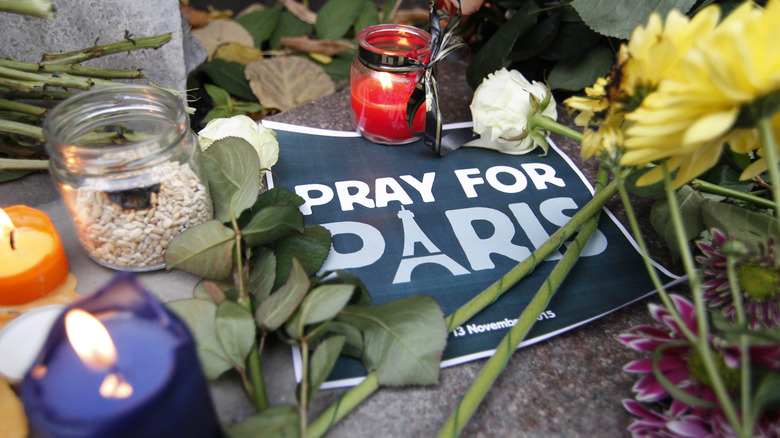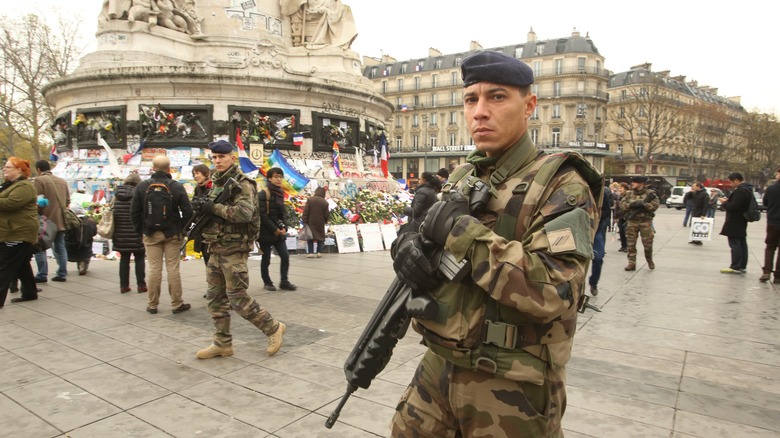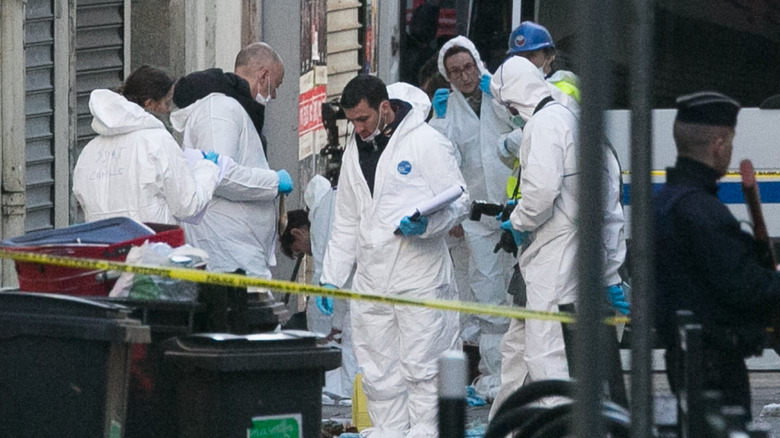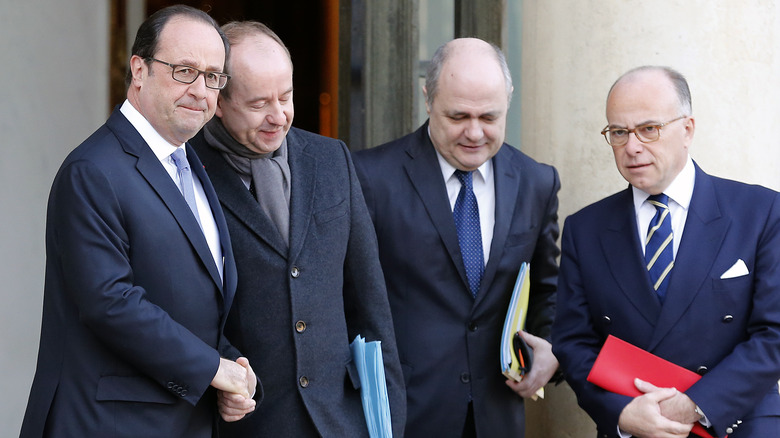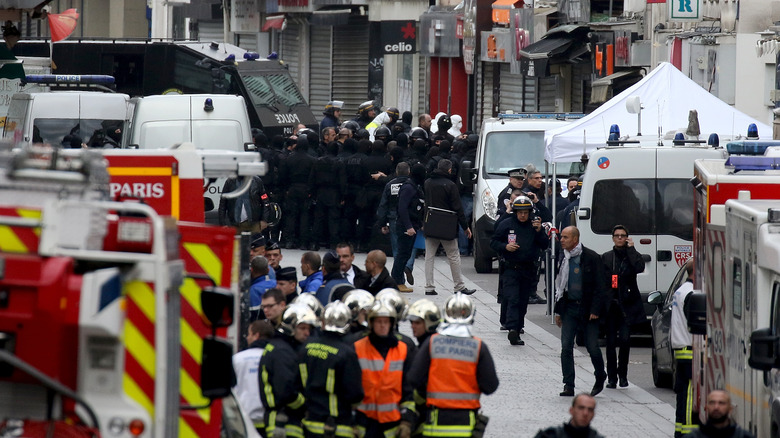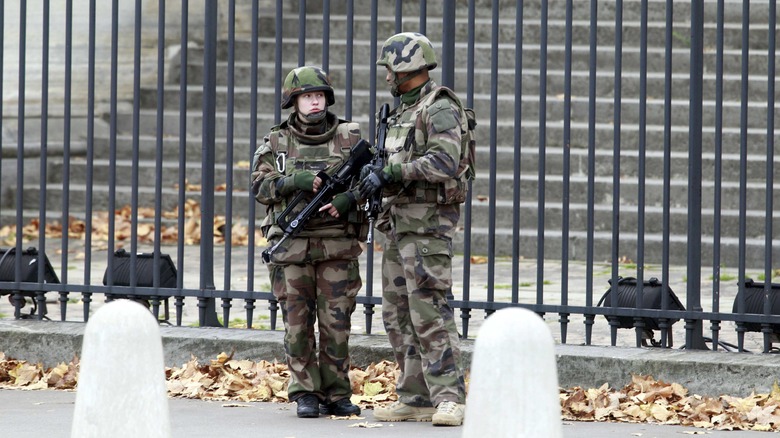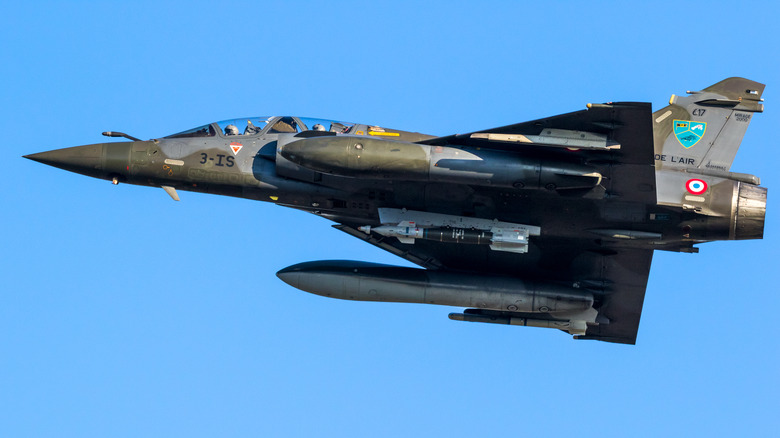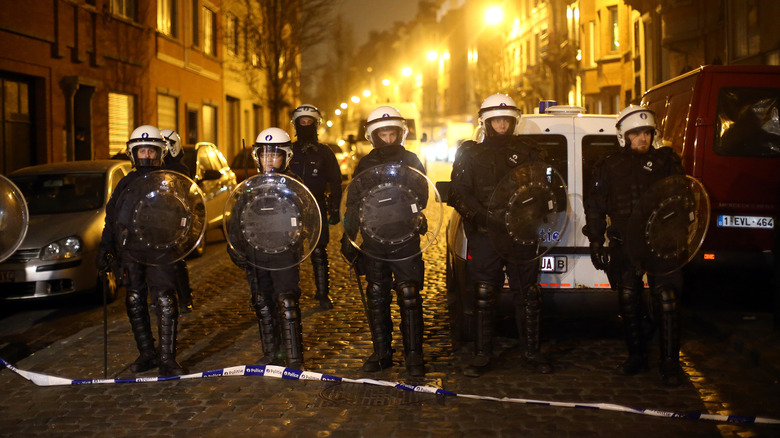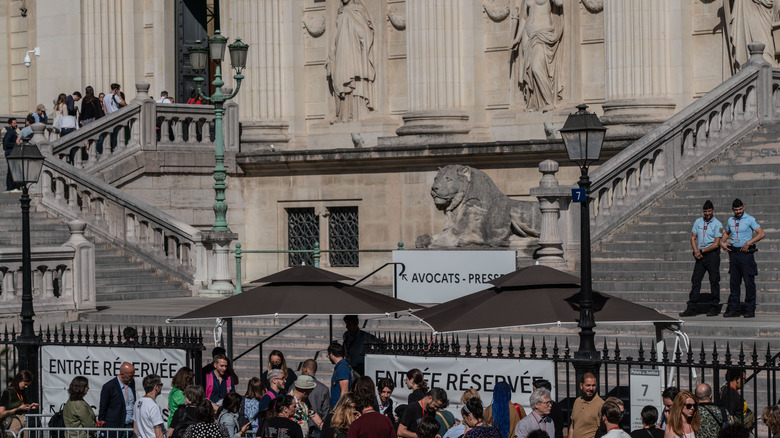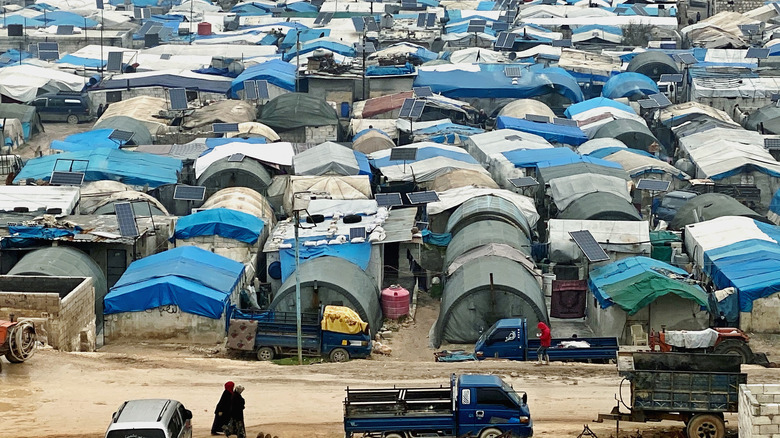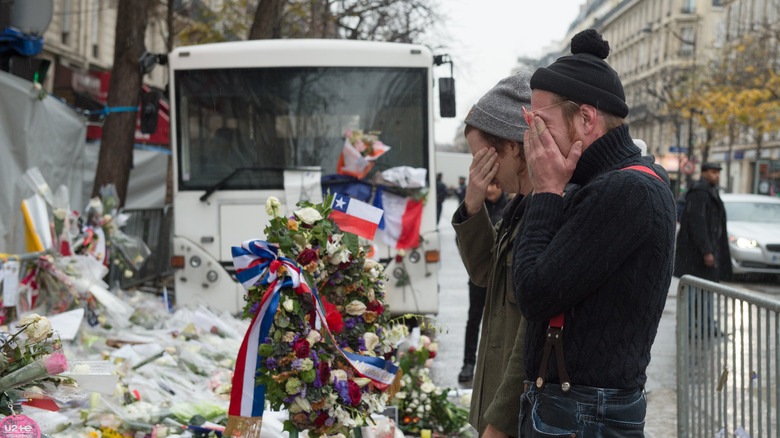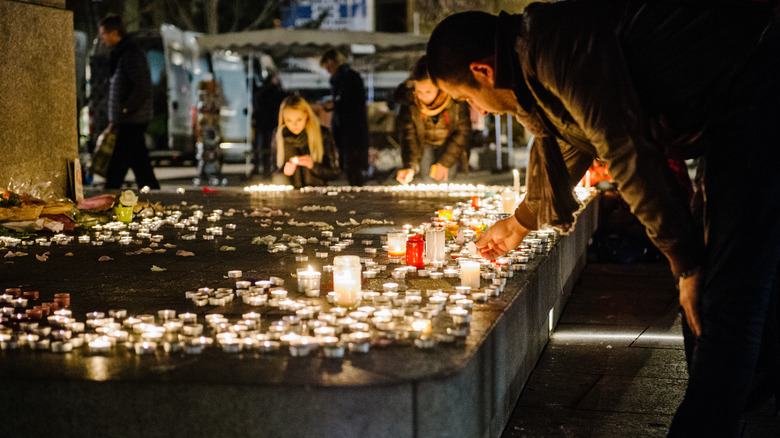What Happened After The 2015 Terrorist Attacks In Paris?
The Paris attacks on November 13, 2015, claimed the lives of 130 people and injured at least 494 others. Terrorists staged six separate attacks in the city, and for a few hours, Paris resembled a war zone as authorities scrambled to save lives. The attacks included three suicide bombs at a soccer game, a series of shootings aimed at local restaurants, and, worst of all, an attack on an Eagles of Death Metal concert at the Bataclan Theatre. The theatre shootings represented the vast majority of the death toll, with trapped patrons unable to evade the gunmen in an enclosed space.
The fallout from the attacks would have profound consequences for France. Three of the 10 attackers successfully fled the scene and went on the run, sparking a nationwide manhunt that spread to nearby Belgian. In the months that followed, an international terror cell would be uncovered in the ensuing investigation. The revelations that unfolded would spark angry reactions both in France and abroad, changing attitudes to Islam and immigration. The investigation also led to a prolonged state of emergency in France that eventually enshrined new, more authoritarian powers into law.
Finally, many people's lives were personally touched by the horrific attacks. Hundreds were left with PTSD, and countless others came to feel unsafe in their own city. Coupled with several other terrorist attacks in France, the Paris attacks have profoundly impacted the French psyche.
Everything in Paris was shut down
The coordinated November 13th attacks began late in the day across multiple locations, causing panic throughout the night. The last of the crowds hiding in the Bataclan theatre from the terrorist gunmen were not freed until 1 am that night. In this troubling and uncertain atmosphere, authorities told Parisians across the city to go home immediately. Because the Metro was mostly closed down, many walked home or stayed with strangers and friends that night.
By the next day, Paris was gripped by terror as a massive manhunt for the remaining terrorists began; 1,500 troops were deployed on the streets within 24 hours, and the city ground to a dramatic halt. Air traffic was limited, with high-security checks instated on the borders.
Unsure if more attacks would follow, the government shut down every major cultural event and mass gathering in the city. Public protests were prohibited, and highly anticipated soccer and rugby matches were called off. Major sites in and around Paris, like Disneyland, were closed, and the Eiffel Tower had its lights switched off in respect for the dead. Even schools and universities were temporarily shuttered.
Islamic State claimed responsibility for the attacks
The world did not have to guess who committed the Paris attacks for long. The Islamic State group immediately became the prime suspect in the case due to their comfort with indiscriminately killing civilians. The next day, the group officially claimed responsibility for the murders, posting a statement online on the Telegram messaging platform.
The message referred to Paris as the capital of prostitution and vice, calling the attackers "soldiers of the Caliphate." It went on to state, "Let France and all nations following its path know that they will continue to be at the top of the target list for the Islamic State ... as long as they dare to curse our Prophet ... as long as they boast about their war against Islam in France and their strikes against Muslims " (via Vox). At the time, France was one of many nations involved in the civil war in Syria and had been carrying out airstrikes against Islamic State strongholds there and in Iraq.
Online, Islamic State supporters immediately responded with celebratory remarks, but initially, the authenticity of the statement remained in doubt. The lack of detail about the attackers led some to question if the group was trying to claim glory for an attack they weren't involved in; however, in the months that followed, the terrorists' links to Islamic State would be firmly established.
France went into a state of emergency for 2 whole years
Immediately after the attacks, France put itself on a war footing that lasted far longer than expected. That week, a 12-day "state of emergency" was declared, and President François Hollande immediately requested it be extended for an additional three months. Police were granted the power to search homes without seeking legal justification, and 150 raids were conducted that weekend alone. Hollande also asked for a range of extraordinary powers during the remainder of his time in office, including the ability to strip terrorists with dual nationality of French citizenship. The proposal was eventually shelved after a dramatic uproar ensued in his cabinet.
Several terror attacks that followed the 2015 disaster — including the 2016 attack in which an extremist drove a truck through a crowd on Bastille Day — helped Hollande to extend the measures continually. In April 2016, The Guardian reported that Paris and much of the rest of France were still filled with soldiers, with 6,500 in total patrolling the capital.
In total, Hollande and his successor Emmanuel Macron prolonged the state of emergency for two whole years. Although the measure finally ended in 2017, Macron introduced controversial sweeping anti-terror legislation in its place. Some of the emergency powers became permanent — French police were granted the ability to shut down extremist religious establishments as they saw fit and were awarded more stop-and-search powers. The measures remain highly controversial today, with critics stating that the new laws are open to abuse by police.
The ensuing manhunt led to a violent raid in St-Denis
Less than a week after the Paris attacks, a series of clues led police to the St-Denis area of Paris, a district popular with immigrants in the city. A lost cell phone, left behind during the November 13th attacks, helped law enforcement identify possible safe house locations. A witness tipped police off that Belgian militant Abdelhamid Abaaoud was hiding out at a St-Denis apartment. Phone data, as well as financial information, helped the authorities confirm his location.
On November 18th, a dramatic seven-hour-long siege commenced, during which an estimated 5,000 rounds of ammunition were exchanged, as well as many explosives. One hundred ten commandoes and police were present during the operation, which began just after 4 am, shocking local Parisians awake with a hail of explosions and gunfire. Five police officers were injured during the attack, and a police dog was shot after being sent into the building, which eventually collapsed from the force of the explosions.
Abaaoud, then identified as one of the ringleaders — was shot dead during the operation. Two of his accomplices — later identified as his cousin Hasna Aït Boulahcen and Belgian-Moroccan extremist Chakib Akrouh — died with him. Akrouh set off a bomb vest rather than be taken alive.
Applications to join the French army spiked dramatically
In the weeks following the attacks, applications to join the French army surged dramatically. The Charlie Hebdo attack, which occurred earlier that year in January, had already caused an initial spike in applications, with numbers rising from 130 applications a day to 500, according to The Guardian. On December 5, 2015, NBC reported that there had been another rise in interest — on average, there were three times more applications per day after November 13 than before (1500, up from around 500). Simple requests for information about signing up also increased 20-fold.
Although reactions to the surge in applications were mixed in France, many welcomed the change, which they framed as a heartening display of patriotism. Speaking with the New York Times, French army recruiter Col. Eric de Lapresle said, "People are coming in and contacting us in droves through social media, using words like liberty, defense, and the fight against terror." Many commentators compared the feverishly nationalistic atmosphere to a similar phenomenon following the 9/11 attacks in the U.S. As in the U.S., the sales of the national flag rose dramatically amid the rise in nationalist sentiment.
France bombed ISIS in retaliation
Although Islamic State purportedly attacked France in retaliation for its military presence in the Middle East, the Paris killings caused a redoubling of French efforts in the region. That weekend, American officials offered the French a list of potential targets, and together they discussed a plan for greater cooperation in Syria. Two days after the terrorist shootings, a sizable French airstrike was launched using jets stationed in the UAE and Jordan.
Ten planes dropped 20 bombs on Raqqa in Syria, which was under Islamic State control at the time. President Francois Hollande justified the bombings by stating that the terrorist attacks were tantamount to an act of war. CNN reports that Interior Minister Bernard Cazeneuve said, "It is not they who will destroy the Republic. The Republic will destroy them ... "
The bombings destroyed an Islamic State arms depot, a command post, and a training camp for potential terrorists. The militants later released a statement that they had expected the attack and that the site had been abandoned before the air raid.
The police tracked down a terror cell in nearby Belgium
By October, just one terrorist from the ten-man group of attackers was still at large: Salah Abdeslam. The night of the attacks, Abdeslam had failed to martyr himself — instead, he fled Paris, receiving a lift to his hideout in Brussels. It would be many months until the police found him again.
Thankfully, Abdeslam's failure to blow himself up ultimately helped police to catch a major terror cell operating out of Belgium. In March 2016, a series of police leads directed authorities to the infamous Molenbeek neighborhood of Brussels, an area rife with Islamic extremism; according to Politico, in 2017, at least 51 groups with terror links were found to be operating out of the dangerous neighborhood. Before finding Abdeslam himself, police discovered additional members of the terrorist cell, including Mohammed Belkaid, an Algerian-born Islamic State operative who is believed to have masterminded the Paris terrorist attacks from the shadows. A few days later, Abdeslam was also found, shot in the leg by police before being arrested.
The successful police operation eventually helped the authorities track down many more Islamic State operatives who had been smuggling fighters into Europe hidden among Syrian refugees. It turned out that the Paris attacks involved many more agents than expected, many of whom would later stand trial for their crimes. Unfortunately, just a few days after Abdeslam was caught, some men who remained at large from the terrorist cell launched the infamous Brussels attack that killed 32 people.
The biggest trial in modern French history began
After years of gathering evidence and investigating suspected terrorists, France began its trial of the Paris attack suspects in 2021. It was the biggest trial in modern French history, involving 1,800 plaintiffs. A special courtroom had to be constructed especially for the case to accommodate the huge number of people attending the trial. By the time the trial commenced, the case file compiled for the proceedings ran to over a million pages, and a staggering 330 lawyers were required to prosecute the defendants.
Despite its colossal scale, the proceedings were finished in just 10 months. All 20 defendants were convicted, although six were tried in absentia, presumed dead, or otherwise missing abroad. Just one of them — Salah Abdesalam — was responsible for carrying out the attacks; everybody else tried in the case had provided logistical assistance to help the now mostly dead killers. Unusually for a French trial, the entire proceedings were recorded on film for posterity.
In addition to the bloody stories told by the witnesses, the testimony of Abdesalam himself proved quite bewildering. At the trial, he told the French nation that his attacks were not personal and that he did not believe he was a violent killer at heart. Nonetheless, as the case progressed, Abdesalam was moved to ask for forgiveness from his victims.
American politicians attempted to drastically decrease immigration from Syria
In the U.S., politicians had a particularly strong reaction to the Paris attacks. Over many months, it was revealed that several men involved in the terrorist plot had gotten into Europe by pretending to be Syrian refugees. When initial suspicions about this were revealed, an immediate backlash occurred in the U.S. According to a CNN report, more than half of American state governors said they would not allow any more Syrian refugees to settle in their state. At that time, President Barack Obama had just okayed an additional 10,000 applications.
Some public figures spoke of a need to increase screening checks, while others rejected the idea of refugees altogether. At the same time, soon-to-be-president Donald Trump suggested a general ban on all Muslims looking to enter the U.S.
A week after the attack, on November 19th, the SAFE Act (American Security Against Foreign Enemies) was put to the House. Had it passed, the Act would have introduced extensive FBI background checks in addition to the DHS checks already in place. According to Al-Jazeera, security screenings of Syrian refugees to the U.S. were already extremely extensive, taking 18-24 months on average. The bill passed in the House after gaining the support of most Republicans and a sizable number of Democrats. However, it was later shot down in the Senate.
Hundreds of people were left disfigured and suffering from PTSD
Aside from the 130 people killed in the attacks, an additional 494 men and women were injured, and hundreds more were left struggling with PTSD. The most high-profile survivors of the attacks, whose stories have been told again and again, are those of the Eagles of Death Metal band members. The musicians were left unscathed after the event but were traumatized after watching 90 people die in the Bataclan arena. According to The Guardian, frontman Jesse Hughes told the Paris courts that he is now nervous in front of crowds and would never be the same again, haunted by thoughts of the victims every day.
Hughes was not alone — those left shaken by the attacks are known as the Bataclan Generation in France. According to a study in Time, more than 50% of the survivors have struggled with ongoing flashbacks, having watched people die before their eyes. Others reported feeling uncomfortable in the parts of Paris where the attacks occurred or visiting enclosed public places. In addition, many survivors were spurred to make radical life changes — such as quitting bad jobs — as a result of their brush with death.
France and the world responded with tears and anger
The outpouring of grief that followed the Paris attacks was unusually large compared to similar disasters. Although day-to-day many terrorist attacks go unnoticed by the great majority of people, the killings in Paris were commemorated with great heartfelt feelings around the world. Famous monuments were lit up to resemble the French tricolor everywhere from San Francisco to Shanghai, and countless ordinary people changed their Facebook photos to display the French flag. Although some saw racism in people's heightened concern for Western victims over their Middle Eastern and African counterparts, others argued that the shock of seeing an attack in a major Western tourist destination was bound to cause increased upset.
In France itself, the Paris murders were met with a mixture of fear, sadness, and outright anger. Although most people showed respect with candlelight vigils and moments of silence, others joined far-right demonstrations. For example, far-right protestors interrupted a solidarity march in Paris the weekend after the attack, shouting anti-Islamic slogans and raising provocative banners. The group threw firecrackers into the crowd but were eventually chased away by the other attendees, furious at the hate-filled interruption. Nonetheless, the attacks changed attitudes in France, pushing many people toward the right. That December, The Guardian reported a significant spike in polling for Marine Le Pen's far-right Front National.
